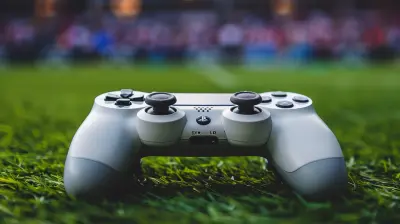The Role of Timing in Rhythm-Based Game Mechanics
28 February 2025
When it comes to rhythm-based games, timing isn’t just important—it’s everything. These games revolve around precision, reaction, and a keen sense of rhythm. But how exactly does timing shape the mechanics and the player experience in rhythm-based games? Grab your headset, crank up the BPM, and let’s dive into the nitty-gritty of why timing is the heartbeat (pun intended) of rhythm games.
What Are Rhythm-Based Games?
Before we jump into why timing is king, let’s break down what rhythm-based games actually are. Think of titles like Dance Dance Revolution, Guitar Hero, Osu!, or even newer sensations like Friday Night Funkin' and Beat Saber. These are games that blend music with gameplay, asking players to interact with beats, rhythms, and melodies.Unlike your typical button-mashing or narrative-driven games, rhythm games require players to synchronize their inputs precisely with cues presented in the game—whether it's hitting a note, tapping a screen, or slashing blocks with lightsabers (looking at you, Beat Saber). They’re all about finding that sweet spot of immersion where music meets action.
Timing: The Core Mechanic of Rhythm Gaming
Let’s face it—if you’re off on timing in a rhythm game, you’re not going far. Timing is the key hook that makes rhythm-based games addictive and satisfying. But why is it so vital?1. Synchronization with Music
Here’s the thing: rhythm games live and die by their connection to music. Your actions must align perfectly with the beat. If you press a button a split second too early or late, you’ll miss the cue. And let’s be honest—there’s no worse feeling than hearing clunk instead of that satisfying “hit!” when you’re off-beat.Games like Guitar Hero and Osu! are designed to make you feel like you’re part of the music. The auditory feedback when you nail the timing right creates a feedback loop that keeps players coming back for more. It’s like being in a band but without the drama of bandmates.
2. Precision vs. Forgiveness
Not all rhythm games are created equal. Some are brutally unforgiving—you’re either on point, or it’s game over (looking at you, hardcore Osu! players). Others, like Taiko no Tatsujin, offer a bit more wiggle room with "good" and "perfect" timings.This balance between requiring absolute precision or allowing slight forgiveness shapes the difficulty curve of rhythm games. It’s also what makes them approachable for newcomers while still offering a challenge for veterans. Timing windows (the amount of time you have to hit a note accurately) determine how accessible or punishing a game feels.
3. Flow and Player Engagement
Great timing mechanics match the flow of the music, which is crucial for keeping players engaged. Ever played a rhythm game where the notes don’t quite match the beat? It’s like trying to dance to a song while tripping over your own feet—not fun. When timing aligns with the music, it pulls the player into a state of flow. It’s that magical moment when you stop overthinking and start feeling the rhythm instinctively.
Timing as a Skill
Let’s be real: not everyone is born with rhythm. For some players, mastering timing in rhythm-based games takes time (pun intended, again). But that’s also what makes these games so satisfying—they’re not just about jamming to your favorite songs; they’re about building a skill.1. Hand-Eye (and Ear!) Coordination
Rhythm games demand a trifecta of coordination: your eyes track the visual cues, your hands (or feet) execute the inputs, and your ears stay tuned to the beat. It’s like juggling, but instead of balls, you’re juggling beats, visuals, and inputs.Take Dance Dance Revolution as an example. You’re stomping on a dance pad while blaring music commands your attention. Miss a step, and you’ll feel like you’re in a bad 2000s workout video. But the more you practice, the sharper your coordination gets. Timing becomes muscle memory.
2. Reaction Speed
Timing in rhythm games is a split-second affair. You’re constantly reacting to on-screen prompts in real time. It’s like playing musical whack-a-mole, but instead of moles, you’ve got beats flying at you like meteors.Games like Friday Night Funkin' up the ante by adding layers of complexity. Not only do you have to time your inputs perfectly, but you also have to navigate increasingly intricate patterns. It’s chaotic and exhilarating—like trying to pat your head and rub your stomach while moonwalking.
The Psychological Impact of Timing
Let’s get a little deep for a second. Have you ever wondered why hitting the right beat in a rhythm game feels so satisfying? There’s actual psychology behind it.1. Reward Systems
Rhythm games operate on a reward system that’s directly tied to timing. When your input lines up perfectly with the beat, you get instant feedback—whether it’s a satisfying sound effect, a combo multiplier, or a shiny “PERFECT!” on your screen. This triggers a dopamine rush, the same kind of “feel-good” chemicals you get from scoring a goal or eating your favorite dessert.That’s why rhythm games can be so addictive. The better your timing, the higher your score, and the more you’re motivated to keep playing.
2. Stress and Flow States
Ever notice how rhythm games can be both stressful and relaxing? It all comes down to timing. When you’re in sync with the game, you hit a flow state—it’s almost meditative. You’re not thinking; you’re just doing. But the moment your timing slips? Oh, hello stress.This push-pull dynamic keeps players on the edge of their seats. The stress of hitting tough patterns is balanced by the euphoria of nailing them. It’s like riding a rollercoaster where the loop-de-loops are made of beats.
How Timing Influences Game Design
Behind every great rhythm game is a ton of thought put into timing mechanics. Developers fine-tune every aspect of how timing interacts with gameplay. Here’s how:1. Note Placement and Patterns
The placement of notes isn’t random. Designers craft note patterns to match the music’s rhythm, melody, and tempo. A fast-paced song? Expect a barrage of rapid notes. A slower ballad? The notes will likely be more spaced out, giving players time to breathe.Timing isn’t just about hitting the notes; it’s about feeling the music. Great rhythm games make you feel like you’re performing the song, not just playing along.
2. Calibration and Latency
Here’s a tech tidbit: timing in rhythm games is heavily reliant on calibration. If there’s even a slight delay between what you see, hear, and input, the entire experience falls apart. That’s why most rhythm games offer settings to calibrate audio and visual latency.Latency issues are a rhythm gamer’s worst nightmare. It’s like trying to clap along to a song when your headphones are out of sync—you’re fighting an uphill battle.
The Future of Timing in Rhythm Games
As technology evolves, so do rhythm games. From traditional button presses to full-body VR experiences, timing mechanics are reaching new levels of immersion. Games like Beat Saber and Pistol Whip are blending rhythm with motion, requiring not just precise timing but accurate physical movements.And let’s not forget AI and procedural generation. Imagine a game that creates rhythm challenges dynamically based on your favorite songs—timing would remain the core mechanic, but now players would face an ever-changing landscape of beats and patterns. Exciting, right?
Wrapping It Up
Timing isn’t just a mechanic in rhythm games—it’s the foundation, the glue that holds everything together. Whether you’re stomping on arrows in DDR, slicing blocks in Beat Saber, or racking up combos in Osu!, your ability to sync your actions with the music is what makes these games so uniquely satisfying.It’s a skill, a challenge, and a reward system all rolled into one. Mastering timing in rhythm-based games isn’t just about getting a high score—it’s about feeling the music, connecting with it, and, for a brief moment, becoming one with the beat.
So, next time you boot up your favorite rhythm game, remember: it’s not just about reacting to the notes—it’s about finding your groove, nailing those beats, and having a blast along the way.
all images in this post were generated using AI tools
Category:
Game MechanicsAuthor:

Leandro Banks
Discussion
rate this article
11 comments
Zain Wyatt
Great insights! Timing truly transforms the gaming experience dramatically.
April 7, 2025 at 2:56 PM

Leandro Banks
Thank you! I'm glad you found it insightful. Timing really is key in enhancing gameplay!
Karly Lynch
This article effectively highlights how timing is crucial in rhythm-based games, shaping player experience and skill development. It’s fascinating to see how different mechanics influence engagement and challenge, showcasing the intricate dance between music and gameplay. A must-read for enthusiasts!
March 31, 2025 at 5:00 AM

Leandro Banks
Thank you for your insightful comment! I'm glad you found the connection between timing and player experience engaging. Your enthusiasm for the topic is appreciated!
Niko Hudson
Fascinating! How does timing really shape player experience and skills?
March 20, 2025 at 4:57 PM

Leandro Banks
Timing is crucial in rhythm-based games as it directly affects player feedback, skill development, and engagement. Precise timing enhances the flow and challenge, allowing players to improve their coordination and reaction speed while deepening their emotional connection to the gameplay.
Maxine McElroy
This article succinctly captures how crucial timing is in rhythm-based games. It effectively explains how precision enhances gameplay, making it accessible for both new and experienced players.
March 19, 2025 at 5:18 AM

Leandro Banks
Thank you for your thoughtful comment! I'm glad you found the article effective in highlighting the importance of timing in rhythm games for all players.
Veda Simmons
Great article! You’ve effectively highlighted how timing is crucial in rhythm-based games. It’s fascinating to see how precise timing not only enhances gameplay but also deepens player engagement. Your examples effectively illustrate these points. Looking forward to more insights on game mechanics!
March 15, 2025 at 4:42 PM

Leandro Banks
Thank you for your kind words! I'm glad you found the insights on timing engaging. Stay tuned for more discussions on game mechanics!
Felix Baxter
The article effectively highlights how precise timing enhances player engagement and skill development, illustrating the intricate relationship between rhythm mechanics and overall gameplay experience.
March 12, 2025 at 3:32 PM

Leandro Banks
Thank you for your insights! I’m glad the article resonated with you and captured the essential link between timing and player engagement.
Helen Bellamy
Great insights on timing's critical role in rhythm games! Understanding its impact can enhance both gameplay experience and player skill development.
March 12, 2025 at 3:21 AM

Leandro Banks
Thank you! I'm glad you found the insights valuable—timing truly is essential for both enjoyment and skill in rhythm games.
Greyson Schultz
This article brilliantly explores how timing shapes gameplay in rhythm-based games. By analyzing player feedback and rhythm synchronization, it highlights the intricate balance between challenge and enjoyment, essential for crafting engaging game experiences.
March 7, 2025 at 5:44 AM

Leandro Banks
Thank you for your insightful comment! I'm glad you found the analysis of timing and player feedback valuable in understanding the dynamics of rhythm-based games.
Hailey Lamb
Great insights on timing's impact in rhythm-based games! Understanding this aspect can truly enhance gameplay and player experience. Thank you!
March 5, 2025 at 4:49 PM

Leandro Banks
Thank you for your feedback! I'm glad you found the insights on timing valuable for enhancing gameplay.
Miranda Lawrence
Timing is crucial in rhythm games, enhancing player engagement and elevating the overall experience.
March 4, 2025 at 5:13 PM

Leandro Banks
Thank you! Indeed, precise timing is key to creating an immersive and engaging rhythm game experience.
Kristen Estes
Great article! I appreciate how you emphasized the importance of timing in rhythm games. It’s fascinating how it can transform gameplay experience. Your insights really enhance my understanding of what makes these games so engaging. Thank you for sharing!
March 4, 2025 at 5:54 AM

Leandro Banks
Thank you for your thoughtful feedback! I'm glad you found the emphasis on timing insightful—it truly is key to the rhythm gaming experience.
MORE POSTS

The Role of AI in Enhancing Opponent Difficulty in Sports Games

Mastering Legendary Gear: Tips for Maximizing Their Potential

Event Triggers in Games: Creating Dynamic Responses to Player Actions

Secrets to Building a Loyal Twitch Community

Secret Deals Hidden in Developer Official Stores

Single Player Games with Realistic World Building You Won’t Forget

Why Some Trophies Are Worth the Grind

How Artificial Intelligence Makes Single Player Games Smarter